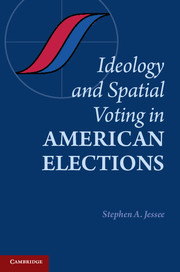Book contents
- Frontmatter
- Contents
- List of Figures
- List of Tables
- Preface
- 1 Introduction
- 2 Political Ideology
- 3 Measuring Political Ideology
- 4 Linking Theory and Empirics: Testing Spatial Voting Theory
- 5 Partisanship versus Proximity: The Effect of Party Identification on Spatial Voting
- 6 Political Information and Spatial Voting
- 7 The Political Perceptions of Citizens
- 8 Conclusion
- Appendix A Survey Question Wordings
- Appendix B Survey Sample Characteristics
- Appendix C Simplified Analyses of Ideology and Spatial Voting
- Appendix D American National Election Studies Analyses
- Bibliography
- Index
8 - Conclusion
Published online by Cambridge University Press: 05 August 2012
- Frontmatter
- Contents
- List of Figures
- List of Tables
- Preface
- 1 Introduction
- 2 Political Ideology
- 3 Measuring Political Ideology
- 4 Linking Theory and Empirics: Testing Spatial Voting Theory
- 5 Partisanship versus Proximity: The Effect of Party Identification on Spatial Voting
- 6 Political Information and Spatial Voting
- 7 The Political Perceptions of Citizens
- 8 Conclusion
- Appendix A Survey Question Wordings
- Appendix B Survey Sample Characteristics
- Appendix C Simplified Analyses of Ideology and Spatial Voting
- Appendix D American National Election Studies Analyses
- Bibliography
- Index
Summary
Spatial representations of politics, and of voting in elections more specifically, represent extremely powerful theoretical tools. The simple concept of a single-dimensional policy space forms the basis for a general framework that has the potential to explain the behavior of ordinary voters, candidates, and elected representatives, generating direct and testable predictions at each level. Perhaps more importantly, the basic spatial framework traces a clear and direct line from the views of individual voters to the policies implemented by democratic governments. Understanding the specific nature of the mechanisms connecting these two things is central to understanding and evaluating democratic governance in the American political system. Spatial theory provides arguably the clearest and most parsimonious way of explaining this connection. Individual voters, holding ideological positions on the liberal-conservative spectrum, cast their ballots for the candidate who locates himself closest to the voter's own position. Candidates, anticipating the behavior of voters, choose their positions with the aim of maximizing the number of votes they receive. Elected representatives, with an eye toward pleasing their constituents and keeping their jobs, tailor their voting to please the largest number of constituents possible.
The logic of spatial voting theory also has the potential to bridge what is a significant disconnect between approaches to the study of voting and institutional behavior, particularly in the U.S. Congress. For instance, a large number of theories and general frameworks for the study of Congress begin by assuming that each legislator holds some ideal point representing his or her most preferred policy outcome.
- Type
- Chapter
- Information
- Ideology and Spatial Voting in American Elections , pp. 173 - 184Publisher: Cambridge University PressPrint publication year: 2012



